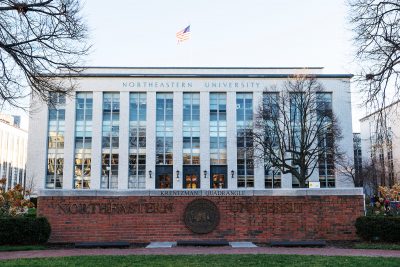
Approximately 150 people gathered at the John D. O’Bryant African-American Institute at Northeastern University on Tuesday evening for the unveiling of the Lower Roxbury Black History Project, an initiative headed by the Northeastern Archives and Special Collections Department.
Margaret Burnham, a professor in the Northeastern School of Law, opened the meeting by saying that the project had been a long time in the making between the community and university.
“We have to acknowledge the voices that are presented, and realize that this is a place in the city of Boston,” Burnham said. “People can benefit from these archives that we’ve put together.”
In 2006, Northeastern President Joseph Aoun met with several members of the Black Ministerial Alliance of Greater Boston to discuss collaborating on a project representing the history of the African American community in Lower Roxbury, according a pamphlet distributed at the meeting.
The project is composed of over 30 audio and video interviews collected by Lolita Parker Jr., a photographer and documentary film researcher, according to the pamphlet. Interviews were collected from 2007 to 2009, including personal artifacts from Roxbury residents.
Massachusetts State Rep. Chynah Tyler spoke at the meeting, attesting to the historical significance of Lower Roxbury and reflecting on her childhood.
“My mother attended college and worked full-time, and relied heavily on the community to provide a helping hand when she couldn’t do it,” Tyler said. “Growing up in Roxbury was truly instrumental in creating a solid foundation for my success.”
Several speakers mentioned positive aspects of the Roxbury community but Massachusetts State Rep. Byron Rushing also recalled the more difficult periods of history that the community has endured in the past.
“We are commemorating and celebrating and for many of us seeing some of the most historic work that anyone can engage in,” Rushing said. “We are talking about a community that was the center for incredible amounts of creativity and that was destroyed.”
Rushing retold the history of how many people living in the West End were forced out by the upper class.
“There is absolutely no excuse for tearing down and displacing, and giving no opportunity for anybody to return to the West End,” Rushing said, earning strong applause from the audience members.
Rushing further elaborated upon the gentrification of the community by giving the example of how certain streets in the South End were destroyed for the Boston Herald to have a new office space.
Rushing said the geography of Lower Roxbury is still present, but the history itself has been destroyed. He also emphasized the importance of the project in preserving this history.
“The people are not wiped out, and we can still tell the whole story,” said Rushing. “It exists in the memories of all of us.”
Reverend Michael Haynes, a Roxbury native, spoke alongside Aoun at the closing speech and said he is thrilled the project will acknowledge the Roxbury community as a whole.
“I was born in Lower Roxbury and raised in this neighborhood, and watching the changes to the neighborhood, and seeing the losses has been hurting me for a long time,” Rushing said. “The things that happened in this turf of Lower Roxbury could fill books and change lives.”
After the speeches, residents gathered together and spoke about the event at a reception. Several, such as Del Brook Binns, 89, of Roxbury, and Richard Brown, 91, of Roxbury, said they attended because they were interviewed as part of the project.
Brown said he and Binns grew up together in the town, attended the same school, and are old friends.
“Back in the old days everything was much simpler,” Brown said. “My father owned a grocery store on the corner and did very well. Everything is different now.”
Elynor Walcott, 70, of the South End, said she came to the meeting because her father was one of the first people interviewed for the project.
“I think it was a wonderful idea, and it touched on an important issue in the city of Boston,” Walcott said. “My father was living in the West End when he was forced to be moved out.”
Napoleon Jones-Henderson, 73, of Roxbury, said Roxbury has a history of having significant figures come out of the neighborhood, but that the community is never acknowledged as the place of origin.
“Roxbury has had dignitaries, historians like Haynes to people like Frederick Douglass and Malcolm X,” Jones-Henderson said. “These people have all lived and been in and out of Roxbury … Important individuals of American history lived in Roxbury, but they’re just seen as being from Boston.”















































































































